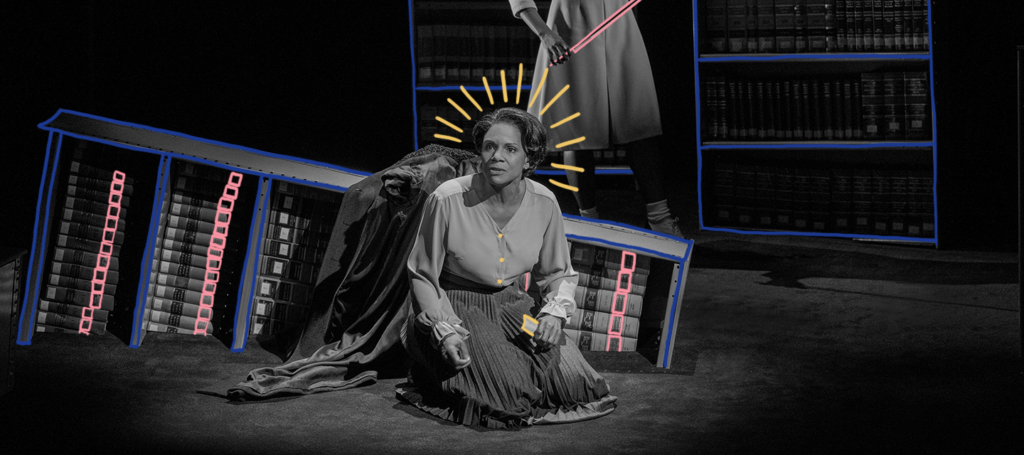


Audra McDonald Does Magic in the Lackluster ‘Ohio State Murders’
Adrienne Kennedy has just opened the recently renamed James Earl Jones Theatre with her Broadway debut― Ohio State Murders. And gee, what an opening it is.
The production is led by six-time Tony-Award winner, Audra McDonald under the helm of Tony Award-winning director Kenny Leon, with a phenomenal set by Tony Award-winning designer Beowulf Boritt, resplendent costumes from Tony-nominated and Drama Desk Award-winning designer Dede Ayite, and phenomenal lights from Tony-nominated designer Allen Lee Hughes. As you can imagine, the entire affair looks as if it cost $50 million.
If only they were working with a better play.
Upon reaching the seating area, audiences are greeted by a gorgeous pre-show art installation of beautifully lit, book-filled bookcases―suspended at various angles above the stage or submerged into the stage floor―while a winter storm rages between two sloping walls in the background. Completing the effect is a recording of Kennedy speaking about her life and thoughts on education.
Following a blackout, we meet Suzanne Alexander (McDonald), a writer who proceeds to narrate her own tragedy as if she has no agency. She explains why her writing is filled with so much violent imagery. As spoken by McDonald, one feels the barely contained rage within every carefully spoken syllable. The power behind her words promises an exciting adventure that never materializes. Not for a lack of trying on McDonald’s part.
Slipping out of her winter cloak, Alexander transforms into a fragile and eager-to-please young virgin who is in love with literature. As the daughter of a well-to-do and college-educated family, she hopes to concentrate on English literature at Ohio State University. Unfortunately, racism bars Black people from doing so without special permission.
Instead, Alexader attends the classes of first-year lecturer Robert Hampshire (Bryce Pinkham), a sullen man who only comes to life when giving impassioned readings of his favorite texts. Within the play, these readings last for minutes at a time.
Alexander’s essays on these writings reveal that she is an analytical prodigy of literature. Soon, with no more care than a passing mention, it is revealed that she is pregnant with twins and that Hampshire is the father. Nearly every major milestone in her life is revealed in this manner.
Alexander is shunned by her family, kicked out of her college lodgings, and forced to live with her Aunt Lou (Lizan Mitchell) in New York. Kennedy has her return to Columbus where she struggles as a single mother. No time is given to why she makes this disastrous decision, though one can surmise that it is out of love for Hampshire. But even then, Kennedy fails to fill us in on what makes Alexander lust for this all-but-invisible man.
Life continues until one of Alexander’s daughters is kidnapped and murdered. This decimates her. A reprieve enters her life when she meets her future husband David (Mister Fitzgerald, who has no lines in the part) who adores and cares for her. Still not quite over Hampshire, she attends another reading and sees that he has become a morose man on the brink of wasting away. After this, it appears that she is ready to move on and marry David.
Disaster strikes again, followed by a return to the present day. Based upon Alexander’s own telling, tragedy is the most interesting thing about her―though the losses she experiences are eclipsed by a fixation on minor details and small-minded musings.
Perhaps this tale would have worked better as a short story rather than what is essentially a 75-minute long monologue with more words given to a white man reading the words of dead white male writers than to all other Black characters in the play combined.
McDonald’s rendering of Alexander’s feelings throughout her life is magnificent. With a slight crease in her voice she ages decades or reverses the time flow with a subtle closing of legs and dip of her neck. Unfortunately, her time-traveling wizardry amounts to little, surrounded as it is by a fixation on minor details. Though it must be noted that I don’t think this play could work with anyone else in the part, either.
Leon’s direction is similarly muted. Much like the text, there is little movement. Perhaps he thought that subtle touches were the way to go. The results are so staid and vague as to not even appear onstage.
With Ohio State Murders, Kennedy has given us a small story about a small woman who was hit by the unthinkable, but whose greatest tragedy is that she doesn’t recognize her worth or agency in delving into what she has experienced. What could have been an interesting tale of overcoming horror yet succumbing to horror, is limited in range and dreadfully dreary.
Keep Reading

“Ain’t No Mo’” is a Ravishing Bouquet of Blackness
The revolutionary power of Black joy takes center stage in the Broadway debut of Jordan E. Cooper’s ravishing play, Ain’t No Mo.’ Much like its 2019 production at the Public Theater, this uproariously gut-punching transfer posits a world wherein every Black person in the United States is offered a one-way ticket to Africa. Far from […]
Read More
‘A Beautiful Noise’ Serves Cheap Thrills but No Drama
Using therapy as the framing for a musical play is a theatrical cheat. In such instances, rather than develop nuanced motivations or put effort into finessing a resolution, playwrights telegraph that their characters are working through trauma and are to be forgiven for anything they do or say―no matter how boring or formulaic. And so […]
Read More












